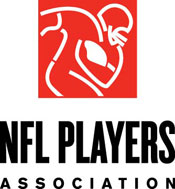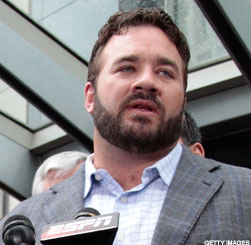 The NFLPA has “re-established itself as a union,” according to a source cited by Howard Fendrich of the AP. Broncos S and NFLPA Exec Committee member Brian Dawkins said recertification was “an easy sell.” Giants OT and player rep Kareem McKenzie said, “The guys really wanted to go ahead. Once they had an idea of what the deal encompassed and all we gained, the guys really wanted to get back to work.” The move was a “key step needed to finish a CBA after the main parts of the deal to end the NFL’s 4 1/2–month lockout were agreed to.” Only a union "can negotiate items such as drug testing, player conduct policy and disability and pension programs." In order for the lockout to “remain lifted and the season to proceed, those issues must be resolved and a full CBA completed by Thursday, a deadline both sides are confident will be met.” Dawkins was “confident the final issues will be settled” (AP, 7/30).
The NFLPA has “re-established itself as a union,” according to a source cited by Howard Fendrich of the AP. Broncos S and NFLPA Exec Committee member Brian Dawkins said recertification was “an easy sell.” Giants OT and player rep Kareem McKenzie said, “The guys really wanted to go ahead. Once they had an idea of what the deal encompassed and all we gained, the guys really wanted to get back to work.” The move was a “key step needed to finish a CBA after the main parts of the deal to end the NFL’s 4 1/2–month lockout were agreed to.” Only a union "can negotiate items such as drug testing, player conduct policy and disability and pension programs." In order for the lockout to “remain lifted and the season to proceed, those issues must be resolved and a full CBA completed by Thursday, a deadline both sides are confident will be met.” Dawkins was “confident the final issues will be settled” (AP, 7/30).
END OF THE ROOKIE HOLDOUT? NFL player agents Blake Baratz and Joey Hartman said that the new rookie compensation system is “essentially a ‘zero-sum game’ because there’s only a finite amount of money that can be used by each team to sign their draft picks.” In Boston, Greg Bedard noted each player “can negotiate above his allocation level,” but that “leaves less money for each team’s draft picks that sign later.” Baratz said players “really don’t have anything to gain by holding out now.” Baratz: “There is no more money for them to get. They took a lot out of the old collective bargaining agreement.” But Bedard noted “some battle lines have been drawn between agents and teams.” Buccaneers DE Adrian Clayborn, the No. 20 overall draft pick, signed a contract that was “fully guaranteed.” Patriots draftee Nate Solder and his reps at Athletes First “rightfully feel that Solder, taken three sports earlier, should be guaranteed as well” (BOSTON GLOBE, 7/31).
BIG HELP FOR SMALL MARKETS: In Jacksonville, Vito Stellino wrote the new CBA is a “boon for the small-market teams such as the Jaguars.” Jaguars Senior VP/Stadium Operations & CFO Bill Prescott said that the deal “could reduce Jaguars’ player costs by about $15 million a year.” But “more important, the deal puts the small-market teams on a more level playing field with the bigger market ones.” Stellino: “Now the players only get 40 percent of the local revenue so the revenue of the big market teams won’t raise the cap as much as in the past. That means the Jaguars are viable financially in Jacksonville for the foreseeable future” (FLORIDA TIMES-UNION, 7/31). Jaguars Owner Wayne Weaver said the CBA is a better deal for the Jaguars than the ’06 deal because player costs “have been lowered.” Weaver: “They will be substantially less than they would have been under the TR (total revenue) system. We now have an AR (all revenue) system. The salary cap will be less over the next 10 years than it would have been under the old system. But the players get a chance to grow with us. It’s a fair system” (FLORIDA TIMES-UNION, 8/1).
GIANT TIME COMMITMENT: In N.Y., Judy Battista notes by NFL Commissioner Roger Goodell’s “calculation, no owner spent more time on negotiations” for a new CBA than Giants President & CEO John Mara. He was “involved in all facets of the negotiations, from the critical economics of the deal to, near the end of negotiations, the creation of new work rules for players.” Goodell said, “In addition to the time commitment that he had is the influence he has not just with his partners, meaning the NFL owners, but also with the players. He has a tremendous amount of credibility and influence with them.” Mara acknowledged that he “lost his temper once out of sight of the players, late at night during a negotiating session in Minneapolis when the mediator, Judge Arthur Boylan, calmed him down.” But the players “knew when Mara was unhappy.” NFLPA President Kevin Mawae said, “He doesn’t have a very good poker face. He wouldn’t say anything. But his face just shows it all.” Several players said that Mara, “widely regarded in league circles as a moderate owner, came across as a hard-liner early on.” But Mara said, “I was never out for blood; I just wanted to get a fair deal and a long-term deal” (N.Y. TIMES, 8/1).
 |
Saturday was integral part of players' negotiating
team during recent CBA talks |
OTHER KEY FIGURES: In Atlanta, D. Orlando Ledbetter noted Falcons President and NFL Management Council Exec Committee member Rich McKay “played a major role in restoring labor peace.” McKay “was in Minnesota when Judge Susan Nelson made her ruling to lift the lockout in late April.” He was “at the table during court-ordered mediation,” and he “was in Atlanta when the owners approved the agreement.” NFL Exec VP/Labor & General Counsel Jeff Pash: “Of all the club executives, Rich had the most sustained and substantial involvement.” Ledbetter noted McKay was “heavily involved in creating the new rookie salary system and with some of the practice rules.” McKay “hopes that the NFLPA will be open to tinkering with the rules going forward if the coaches find them too restrictive in terms of less contact and no two-a-day practices” (ATLANTA CONSTITUTION, 7/31). Meanwhile, in Indianapolis, Mike Chappell wrote one person who “seemed omnipresent” during the lockout was Colts C and NFLPA Exec Committee member Jeff Saturday, who “always has displayed leadership qualities.” Saturday “has deep ties to the players’ union.” He was “certain he wanted to commit himself and his offseason to helping the NFL attain labor peace but also knew the decision wasn’t his alone.” Saturday said, “I’m awfully proud of how hard everybody worked to get this done. It gives you a sense of relief and excitement that we get back to the business of football” (INDIANAPOLIS STAR, 7/31).
INSIDE THE TALKS: NFL outside counsel David Boies sat for a Q&A with the WALL STREET JOURNAL's Vanessa O'Connell, who asked how Boies' work on the NFL lockout was "different from other cases." Boies said, "Most cases I take on point towards a trial. Here, this was something that was going be settled at the bargaining table. ... The union could get an injunction to stop the lockout. They told the players, 'slam dunk, guaranteed.' We didn't think they could get an injunction that would be sustainable. We were right. Once we won that in the court of appeals, I think a settlement became inevitable. The players had a litigation strategy as opposed to a negotiation strategy. When the litigation strategy was blocked, then they were going to come back to the bargaining table and bargain in good faith." Meanwhile, NFLPA class counsel James Quinn said Boies "David wasn't there for a lot of these things." Quinn "described his account as 'one sided' and inaccurate" (WALL STREET JOURNAL, 8/1).
MORE RETIREE WRANGLING: Pro Football HOFer Carl Eller said that the NFL informed his legal team Friday that the NFLPA “has taken $500 million that could have benefited retirees.” Eller said, “We would not have heard of this if we would have waited for the players association or Nolan Harrison to give us this information. The NFL felt this is information we should have.” But Harrison, the NFLPA’s Senior Dir of Retired Player Services, said, “No one from the NFL has informed me of this, so we can’t comment on anything that we’ve gotten confirmation from the league itself. In turn, we have no idea what Carl is talking about. I have no idea where this is coming from.” In Chicago, Sean Jensen noted Eller was “referring to the $50 million a year the NFL has pledged” to player health and safety, and he “reached a half billion dollars because it’s a 10-year deal.” But a source said that the NFLPA “doesn’t control that entire amount because some of it is earmarked for medical research and NFL and NFLPA charities.” There are “conditions to improve the post-career medical options, the disability plan, to create or improve career transition and degree completion programs, as well as the Player Care Program” (CHICAGO SUN-TIMES, 7/31).


 The NFLPA has “re-established itself as a union,” according to a source cited by Howard Fendrich of the AP. Broncos S and NFLPA Exec Committee member Brian Dawkins said recertification was “an easy sell.” Giants OT and player rep Kareem McKenzie said, “The guys really wanted to go ahead. Once they had an idea of what the deal encompassed and all we gained, the guys really wanted to get back to work.” The move was a “key step needed to finish a CBA after the main parts of the deal to end the NFL’s 4 1/2–month lockout were agreed to.” Only a union "can negotiate items such as drug testing, player conduct policy and disability and pension programs." In order for the lockout to “remain lifted and the season to proceed, those issues must be resolved and a full CBA completed by Thursday, a deadline both sides are confident will be met.” Dawkins was “confident the final issues will be settled” (AP, 7/30).
The NFLPA has “re-established itself as a union,” according to a source cited by Howard Fendrich of the AP. Broncos S and NFLPA Exec Committee member Brian Dawkins said recertification was “an easy sell.” Giants OT and player rep Kareem McKenzie said, “The guys really wanted to go ahead. Once they had an idea of what the deal encompassed and all we gained, the guys really wanted to get back to work.” The move was a “key step needed to finish a CBA after the main parts of the deal to end the NFL’s 4 1/2–month lockout were agreed to.” Only a union "can negotiate items such as drug testing, player conduct policy and disability and pension programs." In order for the lockout to “remain lifted and the season to proceed, those issues must be resolved and a full CBA completed by Thursday, a deadline both sides are confident will be met.” Dawkins was “confident the final issues will be settled” (AP, 7/30). 

